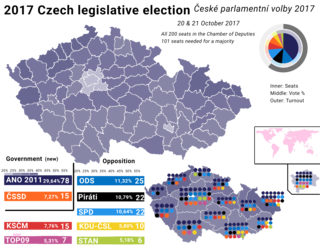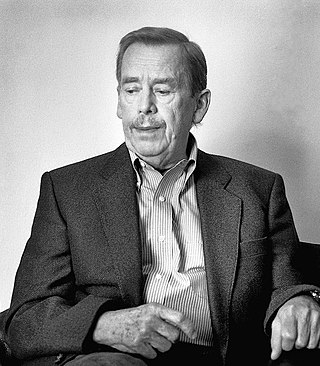
The Czech Republic is a unitary parliamentary republic, in which the president is the head of state and the prime minister is the head of government. Executive power is exercised by the Government of the Czech Republic, which reports to the Chamber of Deputies. The legislature is exercised by the Parliament. The Czech Parliament is bicameral: the upper house of the Parliament is the Senate, and the lower house is the Chamber of Deputies. The Senate consists of 81 members who are elected for six years. The Chamber of Deputies consists of 200 members who are elected for four years. The judiciary system is topped by the trio of the Constitutional Court, Supreme Court and Supreme Administrative Court.

The Civic Democratic Alliance was a conservative-liberal political party in the Czech Republic, active between 1989 and 2007. The ODA was part of government coalitions until 1997 and participated in transformation of the Czech economy. The party was supported by president Václav Havel who voted for it in 1992 and 1996 election.

The Civic Democratic Party is a liberal-conservative and Eurosceptic political party in the Czech Republic. The party generally sits centre-right to right-wing on the political spectrum, and holds 34 seats in the Chamber of Deputies, and is the second strongest party by number of seats following the 2021 election. It is the only political party in the Czech Republic that has maintained an uninterrupted representation in the Chamber of Deputies.
The Czech Republic has offered registered partnerships for same-sex couples since 1 July 2006. Registered partnerships grant several of the rights of marriage, including inheritance, the right to declare a same-sex partner as next of kin, hospital visitation rights, jail and prison visitation rights, spousal privilege, and alimony rights, but do not allow joint adoption, widow's pension, or joint property rights. The registered partnership law was passed in March 2006 and went into effect on 1 July 2006. The country also grants unregistered cohabitation status to "persons living in a common household" that gives couples inheritance and succession rights in housing.

The Senate is the upper house of the Parliament of the Czech Republic. The seat of the Senate is Wallenstein Palace in Prague.

Mirek Topolánek is a Czech politician and business manager who served as the prime minister of the Czech Republic from 2006 to 2009 and the leader of the Civic Democratic Party (ODS) from 2002 to 2010. Between 2006 and 2009, Topolánek was the member of the Chamber of Deputies (MP) and senator from Ostrava from 1996 until 2004. After leaving the politics in 2010, Topolánek has been active in the electric power industry as a vocal lobbyist for the fossil fuel industry.

Indirect presidential elections were held in the Czech Republic on 8–9 February 2008, in which Parliament elected the President. The candidates standing for election were the incumbent president Václav Klaus and University of Michigan Professor Jan Švejnar.

TOP 09 is a liberal-conservative political party in the Czech Republic, led by Markéta Pekarová Adamová. 14 of its members sit in the Chamber of Deputies, and three of them are MEPs.

Early parliamentary elections were held in the Czech Republic on 25 and 26 October 2013, seven months before the constitutional expiry of the elected parliament's four-year legislative term.

Indirect presidential elections were held in the Czech Republic in January and February 2003 to elect a new President. The Parliament of the Czech Republic failed to elect a candidate on the first two ballots on the 15 and 24 January. However, on the third round of the third ballot on 28 February, Václav Klaus was elected.

Presidential elections were held in the Czech Republic in January 2013, the country's first direct election for the presidency. No candidate received a majority of the votes in the first round on 11–12 January, so a second round runoff election was held on 25–26 January. Nine individuals secured enough signatures or support of parliamentarians to become official candidates for the office. Miloš Zeman of the Party of Civic Rights (SPOZ) and Karel Schwarzenberg of TOP 09 qualified for the second round, which was won by Zeman with 54.8% of the vote, compared to Schwarzenberg's 45.2%. Zeman assumed office in March 2013 after being sworn in.

Parliamentary elections were held in the Czech Republic on 20 and 21 October 2017. All 200 members of the Chamber of Deputies were elected and Andrej Babiš of ANO 2011, also the leader of the resultant government, became the Prime Minister. The coalition government following the 2013 parliamentary elections consisted of the two largest parties: the Czech Social Democratic Party (ČSSD) of Prime Minister Bohuslav Sobotka, and ANO 2011 (ANO), led by former Finance Minister and businessman Andrej Babiš, alongside the Christian and Democratic Union – Czechoslovak People's Party (KDU–ČSL). The largest opposition party was the Communist Party of Bohemia and Moravia (KSČM), followed by centre-right parties TOP 09 and the Civic Democratic Party (ODS).

Indirect presidential elections were held in the Czech Republic on 26 January 1993 to elect the first president of the newly independent country. The president was elected by the members of the Czech Republic Parliament, with Václav Havel emerging as the winner. The election was complicated only by attacks of Republicans against Havel and by bomb threat to the Parliament.

Election of the President of the Chamber of Deputies of the Parliament of the Czech Republic was held on 20 July 1998 after legislative election. Candidate of Civic Democratic Party Václav Klaus was elected the President. He was also supported by Czech Social Democratic Party as a result of Opposition Agreement.

Election of the President of the Chamber of Deputies of the Parliament of the Czech Republic was held in June, July and August 2006. Chamber of Deputies was unable to elect new President for 2 months. Miloslav Vlček was eventually elected the new President. Vlček was considered a provisory President but remained in the position whole term.

Election of the President of the Chamber of Deputies of the Parliament of the Czech Republic was held on 24 June 2010. Miroslava Němcová clashed with Lubomír Zaorálek. Němcová defeated Zaorálek and was elected the new President.

Election of the President of the Chamber of Deputies of the Parliament of the Czech Republic was held on 27 November 2013. Jan Hamáček was elected the new President. Hamáček was the nominee of Czech Social Democratic Party but received support from other coalition parties - ANO 2011, Christian and Democratic Union – Czechoslovak People's Party. Civic Democratic Party and TOP 09 also gave him an endorsement. Hamáček is the youngest President of the Chamber.

Election of the President of the Chamber of Deputies of the Parliament of the Czech Republic was held on 27 June 1996. Miloš Zeman was elected the new President when he defeated Jan Vik.

An election of the President of the Senate of the Czech Republic was held on 18 December 1996. Petr Pithart was elected the first President of the Senate. Pithart was a candidate of the Christian and Democratic Union – Czechoslovak People's Party (KDU-CSL), and his election was opposed primarily by the Civic Democratic Party.

An election of the President of the Senate of the Czech Republic was held on 16 December 1998. Libuše Benešová was elected the new President, defeating the incumbent Petr Pithart.















